| Listing 1 - 10 of 47 | << page >> |
Sort by
|
Book
ISBN: 9789264281080 Year: 2000 Publisher: Paris : OECD Publishing,
Abstract | Keywords | Export | Availability | Bookmark
 Loading...
Loading...Choose an application
- Reference Manager
- EndNote
- RefWorks (Direct export to RefWorks)
La concurrence à laquelle se livrent les gouvernements pour attirer les IDE est un sujet de recherche qui a reçu peu d’attention jusqu'à présent. Pourtant, nombreux sont ceux qui estiment que ce phénomène a des effets néfastes, en ce qu’il conduit les pouvoirs publics à faire passer au second plan les normes de protection de l'environnement ou les droits des travailleurs. Cet ouvrage s’attache aux faits et évalue l'impact de la concurrence entre gouvernements pour attirer les IDE. Cette analyse n’apporte pas directement la preuve qu’on assiste à un recul généralisé des normes de travail et d'environnement. Toutefois, le recours massif aux incitations à l'investissement, dans les pays de l'OCDE comme dans les pays en développement, ne joue pas en faveur de la transparence et de la responsabilité des autorités à l'égard du public, ce qui est hautement préjudiciable à l'élaboration des politiques économiques et à l'édification d'institutions démocratiques dans les pays en développement. L'auteur propose d’opter pour une approche basée sur des règles nationales et internationales, plutôt que de chercher à attirer les IDE par des mesures fondées sur des incitations.
Investments, Foreign --- Capital exports --- Capital imports --- FDI (Foreign direct investment) --- Foreign direct investment --- Foreign investment --- Foreign investments --- International investment --- Offshore investments --- Outward investments --- Capital movements --- Investments
Book
ISBN: 9211124646 9789211124644 Year: 2000 Volume: 3 Publisher: New York United Nations
Abstract | Keywords | Export | Availability | Bookmark
 Loading...
Loading...Choose an application
- Reference Manager
- EndNote
- RefWorks (Direct export to RefWorks)
Investments, Foreign --- Uganda --- Economic policy --- -Capital exports --- Capital imports --- FDI (Foreign direct investment) --- Foreign direct investment --- Foreign investment --- Foreign investments --- International investment --- Offshore investments --- Outward investments --- Capital movements --- Investments --- -Investments, Foreign --- Capital exports --- Investments, Foreign - Uganda --- Uganda - Economic policy
Book
ISBN: 9211124743 Year: 2000 Publisher: New York (N.Y.) United Nations
Abstract | Keywords | Export | Availability | Bookmark
 Loading...
Loading...Choose an application
- Reference Manager
- EndNote
- RefWorks (Direct export to RefWorks)
Investments, Foreign --- Peru --- -Capital exports --- Capital imports --- FDI (Foreign direct investment) --- Foreign direct investment --- Foreign investment --- Foreign investments --- International investment --- Offshore investments --- Outward investments --- Capital movements --- Investments --- Economic policy. --- -Peru
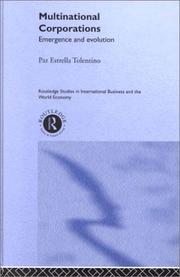
ISBN: 0415145759 0203288548 0203208676 1134759053 1280094419 8763000482 9780203208670 9780415145756 9786610094417 6610094411 9781134759002 9781134759040 9781134759057 1134759045 9788763000482 9781280094415 Year: 2000 Publisher: London New York Routledge
Abstract | Keywords | Export | Availability | Bookmark
 Loading...
Loading...Choose an application
- Reference Manager
- EndNote
- RefWorks (Direct export to RefWorks)
This work presents case studies of the emergence and evolution of MNCs based in 11 developed and developing countries of widely divergent patterns of national development. From this analysis, the author develops a comprehensive theory of the emergence and evolution of MNCs from a macroeconomic perspective.
International business enterprises --- Investments, Foreign --- Technological innovations --- Economic aspects --- Capital exports --- Capital imports --- FDI (Foreign direct investment) --- Foreign direct investment --- Foreign investment --- Foreign investments --- International investment --- Offshore investments --- Outward investments --- Capital movements --- Investments
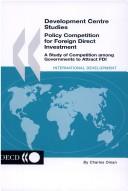
ISBN: 9264171975 9789264181083 9789264171978 9786610030712 1280030712 9264181083 Year: 2000 Publisher: Paris : OECD Publishing,
Abstract | Keywords | Export | Availability | Bookmark
 Loading...
Loading...Choose an application
- Reference Manager
- EndNote
- RefWorks (Direct export to RefWorks)
Competition for foreign direct investment has been neglected as a subject of research. Yet many claim that such competition is having deleterious effects, such as lowering governments’ standards of protection of the environment and workers’ rights.This book looks at the evidence and assesses the impact of competition among governments to attract FDI. It finds little evidence directly to support fears of a "global race to the bottom" in labour and environmental standards. The widespread use of investment incentives, however, in OECD and developing countries alike, tends to be bad for government transparency and accountability. This is highly detrimental both to economic policy making and to the construction of democratic institutions in developing countries. The author proposes a shift away from incentive-based policies for attracting FDI towards a rules-based approach on both a national and international level.
International finance --- Developing countries: economic development problems --- Developing countries --- Investments, Foreign. --- Investments, Foreign --- Government policy. --- Capital exports --- Capital imports --- FDI (Foreign direct investment) --- Foreign direct investment --- Foreign investment --- Foreign investments --- International investment --- Offshore investments --- Outward investments --- Capital movements --- Investments
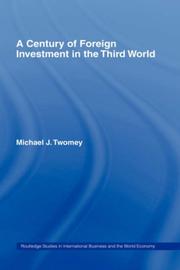
ISBN: 0415233607 1138879398 1134569211 1280402121 0203185943 9780203185940 9780415233606 9781134569168 9781134569205 9781134569212 9781138879393 Year: 2000 Publisher: New York Routledge
Abstract | Keywords | Export | Availability | Bookmark
 Loading...
Loading...Choose an application
- Reference Manager
- EndNote
- RefWorks (Direct export to RefWorks)
The late twentieth century has witnessed a dramatic upsurge in foreign direct investment in the Third World. Based upon thorough statistical analysis, the book presents exhaustive case-studies of foreign investment policy in 'metropolitan' countries and of the experiences of 'host' countries throughout Africa, Asia and Latin America. With a wide geographical and historical focus, it also makes an important contribution to current debates on dependency theory.
International finance --- anno 1900-1999 --- Developing countries --- Investments, Foreign --- Investments. --- History --- Investing --- Investment management --- Portfolio --- Capital exports --- Capital imports --- FDI (Foreign direct investment) --- Foreign direct investment --- Foreign investment --- Foreign investments --- International investment --- Offshore investments --- Outward investments --- Finance --- Disinvestment --- Loans --- Saving and investment --- Speculation --- Capital movements --- Investments
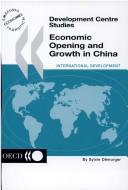
ISBN: 1280030690 9786610030699 9264181075 9264171789 Year: 2000 Volume: *2 Publisher: Paris : OECD Publishing,
Abstract | Keywords | Export | Availability | Bookmark
 Loading...
Loading...Choose an application
- Reference Manager
- EndNote
- RefWorks (Direct export to RefWorks)
China’s remarkable growth in recent years has been often rather arbitrarily ascribed to a number of politico-economic factors. In this volume, the specific effect of foreign direct investment (FDI) inflows is measured quantitatively and estimated on a regional basis. The authors find that there is a much more complex relationship between such flows and growth overall than had hitherto been supposed. While growth associated with FDI flows and a consequent foreign technology input is clearly highest in the coastal, open provinces, geographical dispersion effects can also be identified. In order to avoid widening wealth inequalities, these dispersion effects should be encouraged. Large differences, however, in physical and human capital terms, exist between provinces located on the coast and in the interior of the country and these hinder redistribution of the growth effects of FDI inflows on a national scale. In addition, if China is to continue to benefit substantially from technological progress, domestic research and development capacity will need to be expanded to offset diminishing returns from foreign technology transfers. This implies the adoption of policies designed to increase human capacity development through education and training on a national scale.
China -- Economic conditions -- 1976-2000. --- Investments, Foreign -- China -- Regional disparities. --- Investments, Foreign -- China. --- Investments, Foreign --- Investment & Speculation --- Finance --- Business & Economics --- Regional disparities --- Capital exports --- Capital imports --- FDI (Foreign direct investment) --- Foreign direct investment --- Foreign investment --- Foreign investments --- International investment --- Offshore investments --- Outward investments --- Capital movements --- Investments --- China, People’s Republic --- Investissements étrangers --- China --- Chine --- Economic conditions --- Conditions économiques

ISBN: 9058670910 Year: 2000 Volume: 14 Publisher: Leuven Leuven University Press
Abstract | Keywords | Export | Availability | Bookmark
 Loading...
Loading...Choose an application
- Reference Manager
- EndNote
- RefWorks (Direct export to RefWorks)
Belastingen --- Impôts --- Israël --- Législation --- Wetgeving --- Investments, Foreign --- -Tax havens --- -Tax planning --- -Academic collection --- Tax avoidance --- Tax saving --- Estate planning --- Taxation --- Foreign tax havens --- Tax exemption --- Tax planning --- Capital exports --- Capital imports --- FDI (Foreign direct investment) --- Foreign direct investment --- Foreign investment --- Foreign investments --- International investment --- Offshore investments --- Outward investments --- Capital movements --- Investments --- Law and legislation --- -Investments, Foreign --- -Belastingen --- Tax havens --- Academic collection
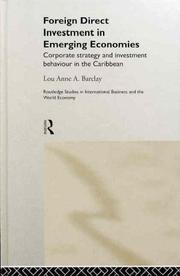
ISBN: 0415220238 1280403527 0203463110 1134600224 9780203463116 9780415220231 9786610403523 661040352X 9781134600229 9781134600175 1134600178 9781134600212 1134600216 9781280403521 Year: 2000 Publisher: London ; New York : Routledge,
Abstract | Keywords | Export | Availability | Bookmark
 Loading...
Loading...Choose an application
- Reference Manager
- EndNote
- RefWorks (Direct export to RefWorks)
The Caribbean countries of Jamaica, Barbados and Trinidad-Tobago represent excellent examples of the increasingly important role played by Foreign Direct Investment (FDI) in less developed, micro-economies. The increased dependence of these countries on FDI, however, calls into question the attractiveness of the business environment of the region to the foreign investor. This volume examines both the investment behaviour and corporate strategies operating in these three countries, and assesses the factors which influence the motivations, location choices and market entry mode of multination
Investments, Foreign --- International business enterprises --- Business enterprises, International --- Corporations, International --- Global corporations --- International corporations --- MNEs (International business enterprises) --- Multinational corporations --- Multinational enterprises --- Transnational corporations --- Capital exports --- Capital imports --- FDI (Foreign direct investment) --- Foreign direct investment --- Foreign investment --- Foreign investments --- International investment --- Offshore investments --- Outward investments --- Business enterprises --- Corporations --- Joint ventures --- Capital movements --- Investments
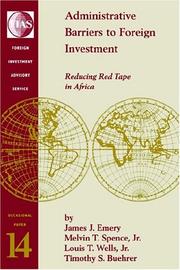
ISBN: 0821346296 9786610014514 1280014512 0585343551 9780585343556 9780813346991 0813346991 0813367689 9780813367682 Year: 2000 Publisher: Boulder : Westview press,
Abstract | Keywords | Export | Availability | Bookmark
 Loading...
Loading...Choose an application
- Reference Manager
- EndNote
- RefWorks (Direct export to RefWorks)
International finance --- Africa --- Investments --- Investments, Foreign --- Bureaucracy --- Capital exports --- Capital imports --- FDI (Foreign direct investment) --- Foreign direct investment --- Foreign investment --- Foreign investments --- International investment --- Offshore investments --- Outward investments --- Capital movements --- Investing --- Investment management --- Portfolio --- Finance --- Disinvestment --- Loans --- Saving and investment --- Speculation --- Interorganizational relations --- Political science --- Public administration --- Organizational sociology --- Law and legislation
| Listing 1 - 10 of 47 | << page >> |
Sort by
|

 Search
Search Feedback
Feedback About UniCat
About UniCat  Help
Help News
News